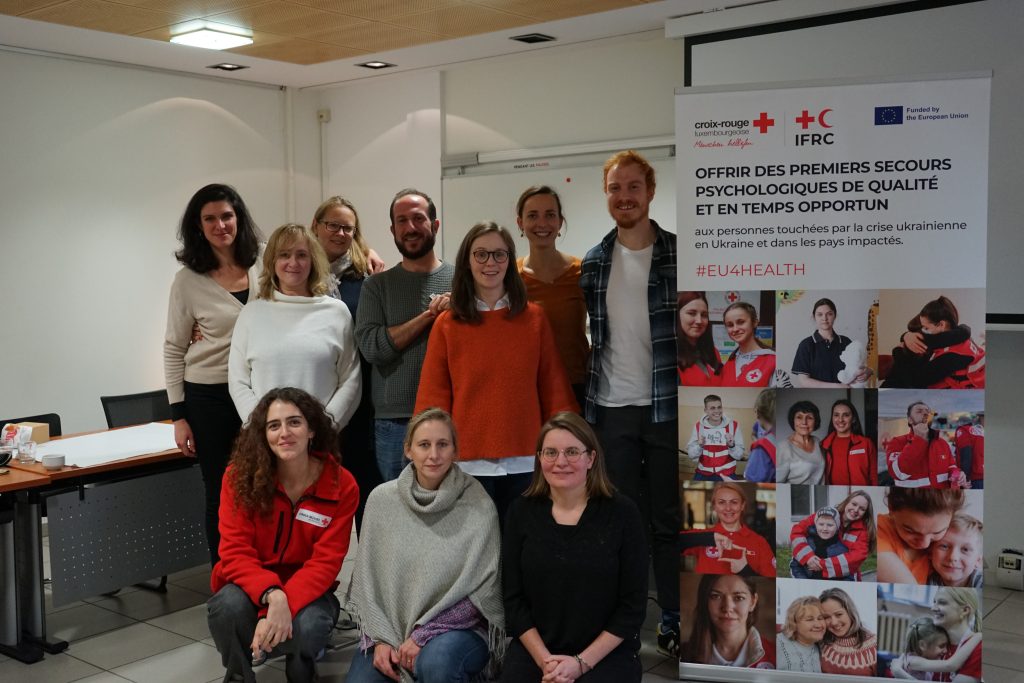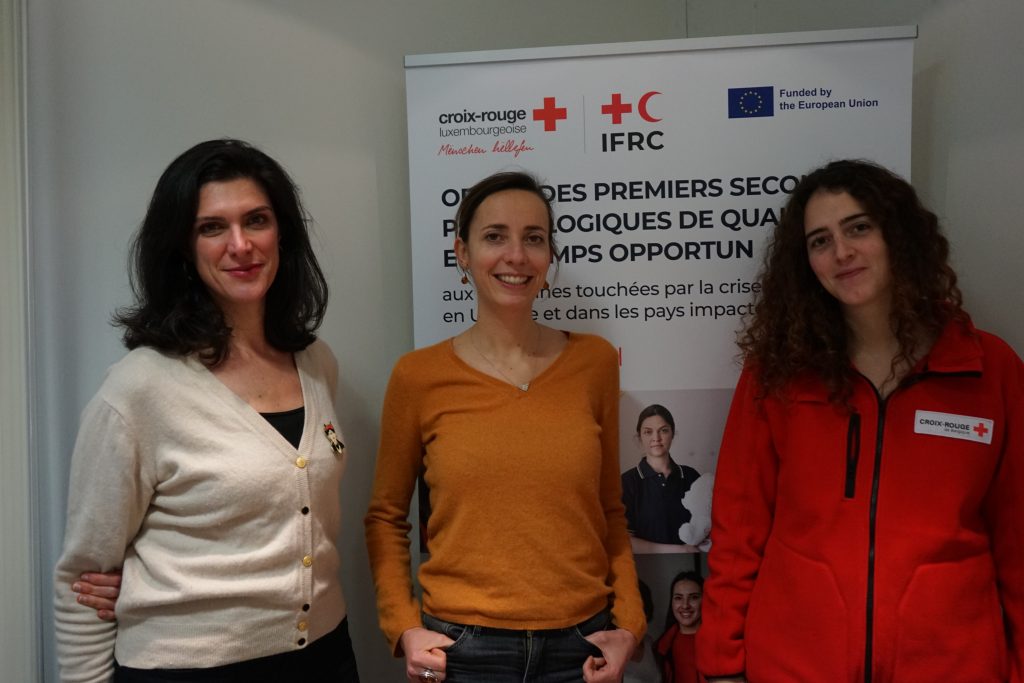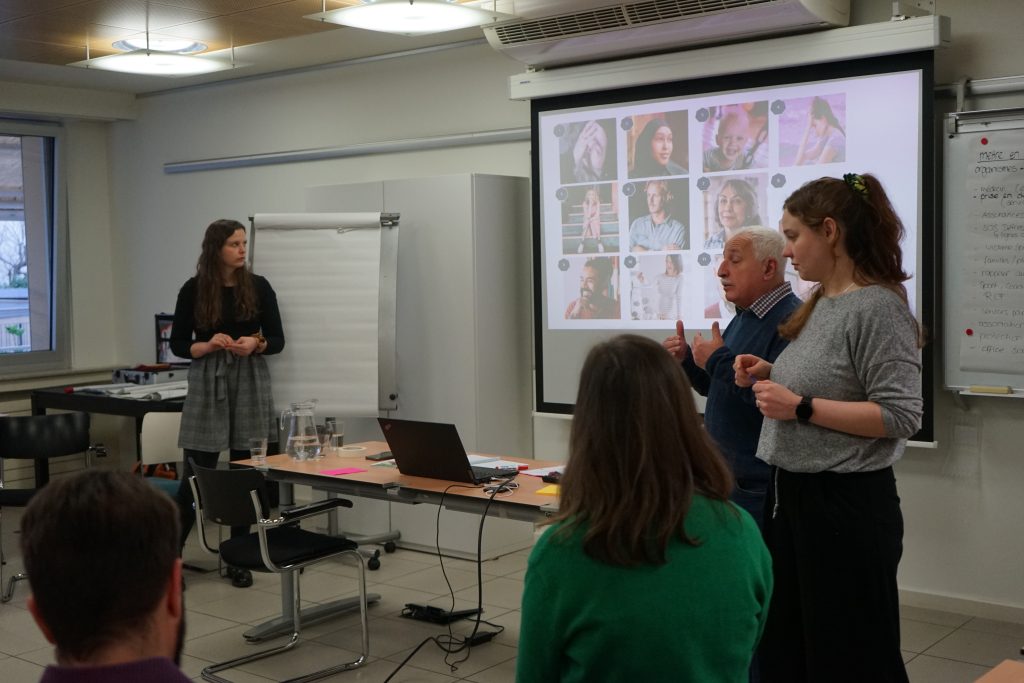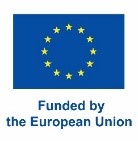17 January 2024

The EU4HEALTH project, funded by the European Commission’s Directorate-General for Health, aims to provide access to psychological first aid and psychosocial support for people affected by the crisis in Ukraine and other concerned countries, and to build the capacity of staff and volunteers working with people fleeing the crisis in Ukraine.
As part of this initiative, a thematic workshop on “Caring for Staff and Volunteers” and a Training of Trainers course in Psychological First Aid were organised by the Luxembourg Red Cross with the support of the PS Centre IFRC (Reference Centre for Psychosocial Support of the International Federation of Red Cross and Red Crescent Societies) and with the collaboration of the Belgian Red Cross.
On 11 December 2023, under the guidance of the PS Centre, the “Caring for Staff and Volunteers” workshop was held, at which participants from the Belgian, Luxembourg and French Red Cross organisations exchanged best practice in terms of support for staff and volunteers, and reflected together on the actions to be taken to improve support for staff and volunteers, all of whom are on the front line when it comes to helping people in distress.
A ” Training of Trainers ” session in Psychological First Aid (PFA) was held from 12 to 15 December. Psychological first aid is a simple but powerful way of helping someone in distress. It involves helping, while paying attention to the person’s reactions, actively listening and, if necessary, providing practical help to remedy immediate problems and basic needs. Acquiring PSP skills and understanding reactions to crises enables the carer not only to help others, but also to apply these same skills to their own crises (PS Centre).
The week’s discussions provided an opportunity to hear first-hand accounts from a number of participants:

Camille Bertholet, EU4HEALTH Project Coordinator, Belgian Red Cross
«The collaboration with the French and Luxembourg Red Cross has been particularly enriching, demonstrating the diversity of possible approaches and opening doors for reflection on how to tackle the challenges we face in Belgium in a holistic way. During our discussions, we shared ideas on best practice and identified areas for improvement. These discussions will be a valuable source of inspiration to guide our future actions within the Belgian Red Cross. »
Ophélie De Soto, Psychologist at the Employee Support and Listening Unit, Luxembourg Red Cross
“Meeting our colleagues from the Belgian and French Red Cross was an enriching experience. It enabled us to discuss different approaches to the prevention of psychosocial risks and to identify practices that could be improved so that we can provide employees with the best possible support in the reality of their day-to-day missions”.
Irène Bogicevic, Psychologist, French Red Cross and EU4HEALTH project manager
“Taking part in this workshop with the Belgian and Luxembourg Red Cross was a great opportunity to share practices, to discuss our strengths as well as our difficulties and what we need to improve. The idea is to be able to pool our thoughts so that we can speak with one voice and perhaps eventually develop joint projects between French-speaking countries”.ancophones ».

The organisers and trainers, Arz Stephan, Technical Advisor at the IFRC PS Centre, and Jill Terres, psychologist at the Migrants and Refugees Service, are very pleased with the commitment and active participation of the participants and future trainers.
“The professional and personal commitment of everyone involved was unparalleled: they were all motivated to learn new approaches, train in new content and techniques, share their practices and work together. It was an enriching week of training and exchange, on both a professional and personal level, with the aim of further strengthening our collaborations and facing challenges together – to provide ever better support to beneficiaries, volunteers and staff. An experience worth repeating!
says Jill Teres


Disclaimer: The views and opinions expressed are those of the authors and do not necessarily reflect those of the European Union or the European Health and Digital Executive Agency (HaDEA). Neither the European Union nor the granting authority can be held responsible for them.